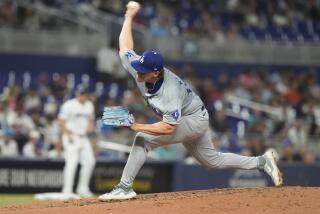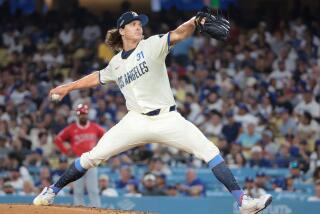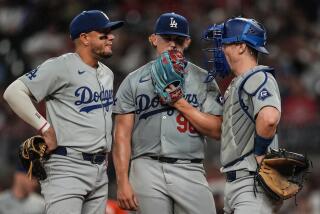Former Titan Beck Still Waiting to Prove He Can Pitch as a Pro : Baseball: Operations and recuperation have kept the Braves’ prospect sidelined almost continuously since 1988.
His story is long, full of twists and turns and surgeries and rehabilitation.
Mark Beck can tell it in two lines.
“Everything was perfect. Then one day, my arm was killing me.”
Beck is a 6-foot-5 right-hander, a strong young man who once had a strong young arm. Before he turned 20, he possessed a fastball that moved and a biting slider.
He struck out 162 batters in 19 games as a sophomore at Cal State Fullerton in 1988, setting a school record and helping his team to the College World Series.
That summer, Beck made the U.S. Olympic team--a team that included Jim Abbott, Ben McDonald and Robin Ventura--when he had to withdraw because of the nagging pain in his shoulder.
It was the beginning of what would become Beck’s long, harrowing journey.
He never pitched another inning of college ball, undergoing surgery the next February to repair and tighten ligaments in the front of his shoulder.
He never became a first-round draft choice, signing in 1989 with the Braves, who selected him in the 16th round after jumpy teams passed over him, worried that Beck might be done for good.
Now, at 23, Beck hasn’t been able to prove those other teams wrong. It has been nearly three full baseball seasons since he was drafted, but Beck has yet to pitch an official inning as a professional.
“I haven’t been able to pitch in single-A or anything,” he said. “The Braves, I’m sure, are sick of me. They’ve been awfully good to me.”
Since the day in 1988 when he first was unable to raise his arm to throw overhanded, he has twice had surgery on his shoulder, once on his back and sustained a broken hand. This spring, as he was trying once more to come back, he also had to face the end of a painful marriage that lasted three months before Beck sought an annulment.
“This kid has gone through more problems, yet he’s just kept his head up through it all,” said Joe Chandler, the Braves’ team orthopedist. “If 99% of players had half the bad luck he had, they’d have given up a long time ago.”
Beck is back at his parents’ home in Lakewood after this most recent, trying season. Not many of his old buddies are around, but when Beck watches the baseball highlights on TV, he sometimes sees the players who used to be his peers.
“I see people I played with, that I’m classified with, up there, and it makes it hard,” Beck said.
Brent Mayne, who caught Beck at Fullerton in 1988, made the Kansas City Royals out of spring training this year, and caught Bret Saberhagen’s no-hitter in August. Beck was supposed to have made it by now, too.
“Looking back now, if there was ever anybody pretty much a sure shot to make the big leagues, it was him,” Mayne said. “I’ve seen a lot of guys coming up through the minor leagues and he had as good a stuff at the time as any of them.”
That’s more agonizing than comforting to Beck.
“That’s the hard part,” he said, “knowing it’s not my ability that’s stopping me.”
Beck is preparing for a winter of weightlifting, readying for a spring training that could be his last.
“If I get healthy, it’s not going to take me very long,” he said. “Heck, right now, I wouldn’t mind being in the minor leagues. If I was healthy I’d be up there pretty quick, maybe in a couple of years.”
In any case, he expects this year to tell the tale.
“If I’m healthy, I’ll be playing. If not, I’ll probably be gone.”
It was difficult for Beck to drop off the Olympic team in 1988, but doctors told him he should rest his arm, and Beck knew that the upcoming college season was the most critical of his career. In June, after completing his junior season, he would be eligible for the draft.
He worked to get ready for the season, but reinjured his arm throwing in January, 1989, shortly before the start of the season. In February, he underwent surgery to repair cartilage in his shoulder and was out for the year.
His promise had been such that Beck’s phone rang off the hook during the draft, even though he hadn’t pitched all year.
“The first day, every team was calling me up and I thought, ‘OK, I’m going to get drafted,’ ” Beck said. “But they’d call up and say, ‘Well, what’s wrong with your arm?’ ”
Teams and scouts faced more than the uncertainty about Beck’s arm. They also didn’t know if he would choose to sign instead of returning to Fullerton, hoping to prove himself enough to be drafted as high as he would have been if he had been eligible after his sophomore year.
The Braves finally took the risk in the 16th round. Beck said he would go back to school, then changed his mind and signed.
“I figured, OK, I’ll get a good signing bonus and that will hold me over til I’m healthy, then I’ll be in the big leagues pretty soon and it will all work out. I can go back to school any time I want.”
It proved to be a good decision. Had he gone back to Fullerton and suffered through the same laborious comeback attempt, he probably wouldn’t have been drafted.
“I’d have been out of baseball,” he said.
The Braves knew the risk they were taking.
“That’s what the draft is, a risk,” said Rod Gilbreath, the Braves’ assistant director of player development. “Mark’s a big, tall strong-looking young man. At one time, he had a real good arm. We’re hoping and praying it will come back to resemble what it was. It comes down to this year. Mark needs to perform this year. I’m sure Mark understands that.”
Beck rehabilitated his arm during the 1989 season, then reported to the fall instructional league, although he wasn’t throwing. By spring training 1990, he was doing light throwing. Then the Braves sent him to Bradenton, Fla., for extended spring training.
“Everything was going pretty well, then I hurt my back,” Beck said.
He remembers the day: Friday, April 13.
He stayed in bed 2 1/2 weeks, then underwent surgery to remove a ruptured disk. Another long rehabilitation was ahead.
Beck returned quicker than expected and, after missing the entire season, he reported to the fall instructional league again.
On the final day, he pitched an inning in a game. It remains the only full inning he has pitched as a professional, even in an unofficial game. The memory is good.
“It’s the first time the Braves had ever seen me pitch,” Beck said. “I jammed the first guy, and got a pop to short. I struck out the next two.
“I thought everything was A-OK. I come home and two weeks later, I’m throwing for a Braves scout here, throwing on the side. I threw about six pitches, and my arm felt dead, weak. It wasn’t sharp, it was weird. It was tightness, all that scar tissue.”
Beck took time off, then started throwing again. Now he was having trouble with the triceps in his right arm, but time off seemed to help.
This spring, Beck reported to spring training again.
“The first day I played catch and the next day my arm was sore in the triceps,” he said. “I couldn’t throw two feet.”
Chandler gave him a cortisone shot, which helped. Beck got on the mound and was throwing well. The Braves sent him to extended spring training again.
“Then all of a sudden my arm gets weak again,” Beck said.
He got another cortisone shot. Later, he got another chance to pitch in a game.
“You get into a game, and you get really into it,” he said. “I threw three pitches, then I just went to the doctor. There was no sharp pain or anything, just all that tightness.”
He would need more surgery, this time an arthroscopic procedure to remove scar tissue resulting from the original procedure.
On top of that, he was struggling this spring with the dissolution of his marriage, which began in January.
“I lost like 30 pounds,” Beck said. “Your brain plays tricks on you. You just don’t feel like eating, and it’s hard to gain weight back in Florida, it’s so hot.”
After surgery in mid-June, Beck returned to Bradenton.
“Everything was going great, then blam, I got hit in the (right) hand with a ball. I was playing catch and turned my head.”
When the hand didn’t improve, he returned to Atlanta, where Chandler inserted pins in it.
It was just the latest in a long line of visits.
“Mark, God Bless him!” says a secretary in Chandler’s office. “If he didn’t have bad luck, he’d have no luck at all.”
Chandler and his staff have become very close to Beck. “I’ve become very attached to him, and I’m not even the one who did the original surgery,” Chandler said. “I’m pulling for him, he’s working so hard, and then I get a call from Florida that he needs pins in his hand. I felt so bad I got tears in my eyes.”
His hand healed, Beck will spend the winter lifting weights, trying to strengthen his arm for next spring.
“Everything looks great. Now I just need to hit the weights like I never have before,” he said.
If Beck doesn’t make it this year, the Braves have a contractual agreement to cover the costs so he can finish college. Already they have paid for his operations.
“It’d be a shame if they paid for all my injuries and I never pitch for them,” Beck said.
Gilbreath searches his brain to think of another young pitcher who came back from surgery and make it to the big leagues.
“I sure can’t, right off hand,” he said. “Of course, at one time Mark had an arm comparable to (Oriole No. 1 draft pick) Ben McDonald.”
It seems longer and longer ago.
Beck doesn’t think back to that so much as he thinks back to the last day of instructional league in 1990, a one-two-three inning.
“I pitched that one inning,” he said. “I know I can pitch again.”
More to Read
Go beyond the scoreboard
Get the latest on L.A.'s teams in the daily Sports Report newsletter.
You may occasionally receive promotional content from the Los Angeles Times.










